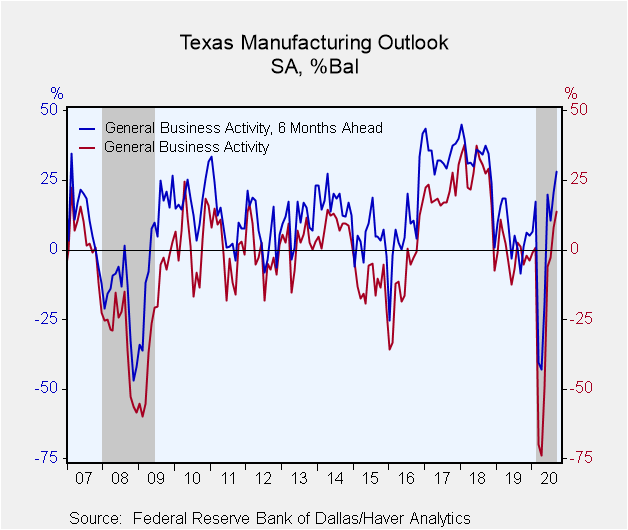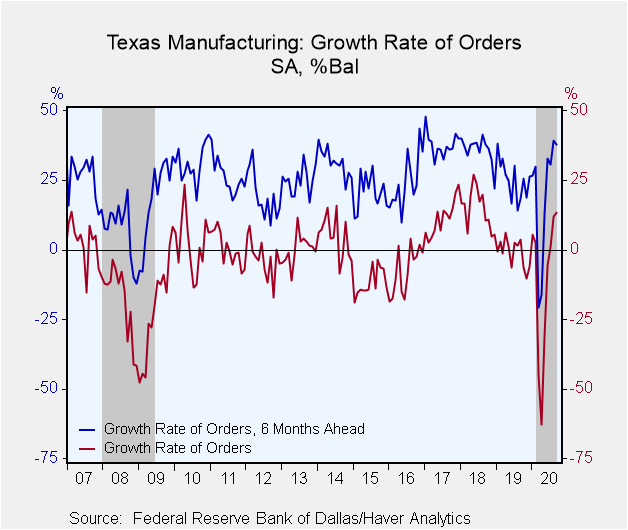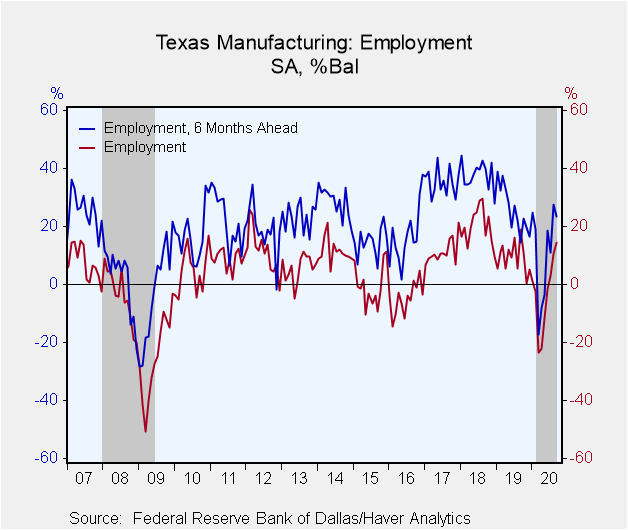 Global| Sep 28 2020
Global| Sep 28 2020Texas Factory Sector Activity Picks Up As COVID-19 Cases Decline
by:Tom Moeller
|in:Economy in Brief
Summary
• Pricing power strengthens. • Expectations continue to improve. The Dallas Federal Reserve reported in its Texas Manufacturing Outlook Survey that the General Business Activity Index increased to 13.6% during September, only the [...]
• Pricing power strengthens.
• Expectations continue to improve.
The Dallas Federal Reserve reported in its Texas Manufacturing Outlook Survey that the General Business Activity Index increased to 13.6% during September, only the third positive reading this year. It was improved from -74.0 in April. (Data extend back to June 2004). The bank reported that by mid-September, new coronavirus cases had dropped 57 percent in Texas from their July high, and hospitalizations had fallen 70 percent. Consumers regained some confidence and are slowly and increasingly leaving home for shopping and work.
Improvement in most of the business indicators was apparent this month with the production index surging to 22.3%, its highest level in two years. Growth in new orders also picked up. The shipments reading slipped to 21.5%, but remained up sharply versus last year. The unfilled orders index also eased but remained up significantly versus negative readings during all of 2019.
The employment index rose to 14.5% in September, its highest level in 12 months. This compared to sharply negative readings during the recession. An increased 24.0% of respondents reported improved hiring while a lessened 9.5% reported a decline. The wages index also rose to 15.9%, its highest level since February.
The index of prices received strengthened this month. At 5.2%, it was the highest reading since April 2019. A steady 13.0% of respondents reported higher prices while a greatly lessened 7.8% reported a decline. The raw materials price measure strengthened to 26.2%, its highest reading since December 2018.
The index of expected business conditions in six months also extended its recent strength with a rise to 28.0% during September. It remained above April's low of -43.0%. Strength amongst expected business indicators was broad-based with the future new orders, production and shipments readings strong. The expected employment index eased slightly, but a fairly steady 34.7% of respondents expected higher employment while a slightly higher 11.4% expected a decline. Future wages also strengthened sharply to the highest level in just over a year.
Each index is calculated by subtracting the percentage reporting a decrease from the percentage reporting an increase. When all firms report rising activity, an index will register 100. An index will register -100 when all firms report a decrease. An index will be zero when the number of firms reporting an increase or decrease is equal. Items may not add up to 100% because of rounding. Data for the Texas Manufacturing Outlook can be found in Haver's SURVEYS database.
| Texas Manufacturing Outlook Survey (SA, % Balance) | Sep | Aug | Jul | Sep '19 | 2019 | 2018 | 2017 |
|---|---|---|---|---|---|---|---|
| Current General Business Activity Index | 13.6 | 8.0 | -3.0 | 1.0 | -1.1 | 25.8 | 20.6 |
| Production | 22.3 | 13.1 | 16.1 | 13.9 | 8.9 | 21.4 | 20.2 |
| Growth Rate of New Orders | 13.2 | 11.8 | 1.3 | 3.7 | -1.1 | 14.8 | 11.4 |
| Employment | 14.5 | 10.6 | 3.1 | 18.8 | 9.5 | 20.0 | 11.4 |
| Wages & Benefits | 15.9 | 15.2 | 9.0 | 16.9 | 23.5 | 29.7 | 22.2 |
| Prices Received for Finished Goods | 5.2 | 0.9 | -1.5 | 1.2 | 2.5 | 17.6 | 12.7 |
| General Business Activity Index Expected in Six Months | 28.0 | 20.4 | 10.6 | -8.5 | 6.4 | 31.6 | 34.6 |
| Production | 47.8 | 43.0 | 37.2 | 25.0 | 35.6 | 48.6 | 46.9 |
| Growth Rate of New Orders | 37.6 | 39.2 | 30.4 | 18.2 | 25.2 | 35.8 | 37.7 |
| Employment | 23.3 | 27.6 | 11.1 | 14.6 | 26.1 | 37.7 | 35.3 |
| Wages & Benefits | 38.1 | 28.1 | 22.5 | 35.3 | 39.7 | 50.4 | 43.4 |
Tom Moeller
AuthorMore in Author Profile »Prior to joining Haver Analytics in 2000, Mr. Moeller worked as the Economist at Chancellor Capital Management from 1985 to 1999. There, he developed comprehensive economic forecasts and interpreted economic data for equity and fixed income portfolio managers. Also at Chancellor, Mr. Moeller worked as an equity analyst and was responsible for researching and rating companies in the economically sensitive automobile and housing industries for investment in Chancellor’s equity portfolio. Prior to joining Chancellor, Mr. Moeller was an Economist at Citibank from 1979 to 1984. He also analyzed pricing behavior in the metals industry for the Council on Wage and Price Stability in Washington, D.C. In 1999, Mr. Moeller received the award for most accurate forecast from the Forecasters' Club of New York. From 1990 to 1992 he was President of the New York Association for Business Economists. Mr. Moeller earned an M.B.A. in Finance from Fordham University, where he graduated in 1987. He holds a Bachelor of Arts in Economics from George Washington University.
More Economy in Brief
 Global| Feb 05 2026
Global| Feb 05 2026Charts of the Week: Balanced Policy, Resilient Data and AI Narratives
by:Andrew Cates










